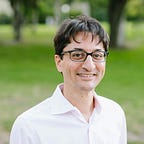Should Startups Work on Global Problems? Is the Pope Catholic?
Pope Francis drives an old Ford Focus. He wears cheap orthopedic shoes. He took the bulletproof glass off the famous popemobile, saying it was better to be close to the people and take his chances. He never moved into the official Papal quarters in the Vatican and instead lives in a small apartment. The pontiff, as the kids would say, is legit.
Religion and business operate in different worlds. I admit that I really never thought of combining them before.
And while the words “startup” and “Vatican” don’t often appear together in the same sentence, The Laudato Si’ Challenge is the new startup accelerator just announced at the Pontifical Academy of Sciences at the Vatican.
When I realized that this was an ambitious project in line with my own ideal of entrepreneurship I was intrigued and humbled to be asked to be the Program Director.
Technology and entrepreneurship should have a by-product, which is that people’s lives improve and the world becomes a better place. We don’t always think about that when building companies.
The Laudato Si’ Challenge focuses on the broad areas below, based on Pope Francis’s encyclical on Our Common Home (Laudato Si’). Each area represents a huge opportunity to make the world better and also build great businesses. We’re looking for companies building for these opportunities.
There’s More Than Silicon Valley
Laudato Si’ is about the ecology of the planet as a reflection of business practices. His call-to-action is an “urgent challenge to protect our common home…” stressing “a concern to bring the whole human family together to seek a sustainable and integral development…”
Each area below is a somewhat fragile sector and an area that can be transformed from crisis into opportunity. We look for companies in these focus areas:
The Energy Opportunity
To transform our energy generation, transportation, industrial and building systems for environmental benefit and to ensure access to energy for all.
The Food Opportunity
To remake our food systems (both for humans and animals) to minimize contributions to pollution, make them resilient to a changing climate, and ensure food security.
The Water Opportunity
To ensure access to clean water for all.
The Urban Opportunity
To remake our cities so that they are resilient and powered in ways that do not contribute to adverse environmental change, and structured to offer high life quality and abundant opportunities to fulfill each individual’s own potential.
The Human Potential Opportunity
To grow opportunities for meaningful employment and entrepreneurship. Minimize human suffering resulting from issues related to forced migration, health, and environmental change.
The Conservation Opportunity
To preserve the world’s most fragile ecosystems, preserve global biodiversity and maintain healthy and thriving ecosystems worldwide.
The Finance & industry Opportunity
To restructure institutions to provide business, entrepreneurial, and investor communities incentives to align their efforts with the care of our common home.
I’ve worked with lots of startups. I’m a professor of entrepreneurship who also helps students get their first serious jobs and create companies. I have two young kids.
These opportunities are in my mind every day.
About the Program
If you’re building solutions to the above opportunities you might want to apply.
You will ideally have some traction but will probably be pre Series-A stage. You don’t need to consider yourself a social entrepreneur or social impact organization as long as you are working in one of the seven areas above. You’ll work with a team including me, international investors, and others who have worked with and invested in startups before.
This accelerator is open to all businesspeople, of all faiths and backgrounds.
The program carries a $100K seed investment (funding not from the Vatican) and runs much like other accelerators. What’s exceptional is that we’re funding solutions that are simultaneously beneficial to our common environment and humanity.
The accelerator team has worked with and invested in many startups. We’re from all over, but the in-person program is physically based in Rome July 13 — September 9, 2017 and the demo day is scheduled at… the Vatican. Remote mentorship starts for selected companies in June and continues for six months.
Who You’re Dealing With
Since I’m the program director and one of the people that you’ll interact with, I thought I’d tell you about myself.
This is the third startup accelerator I’ve run. I’m sure it will also be the third time people tell me it can’t be done successfully. Before the Laudato Si Challenge, I co-founded and ran AcceleratorHK, the first accelerator in Hong Kong. I’m also a professor of entrepreneurship at the University of Southern California (USC), teaching classes in Feasibility Analysis and Growth Hacking, and I run the USC Incubator, the program for companies started by students, alumni, and faculty of USC.
In my previous programs we’ve seen multiple acquisitions, millions of dollars raised, millions of dollars of earned revenue, multiple successful Kickstarter campaigns, and many prizes and awarded grants.
In any program I’m involved in, I look for founders who are coachable (otherwise why join an accelerator?), capable of building what they need, and committed to following through.
If you know a startup that might be a fit, then forward them this post. If you like what we’re doing, please share and click the heart below.
Applications due June 5, 2017 (hint: apply early). We hope to see you in Rome!
And here’s an update from December 2017.
